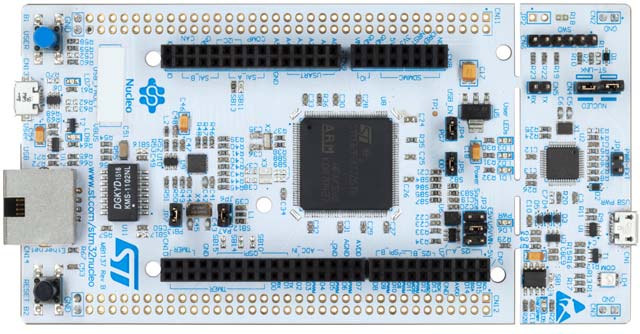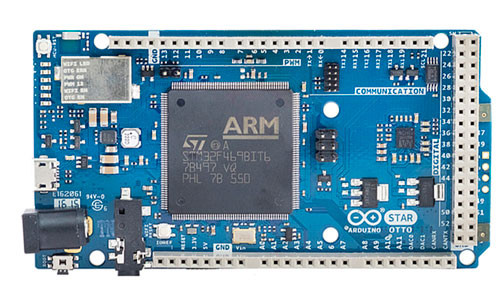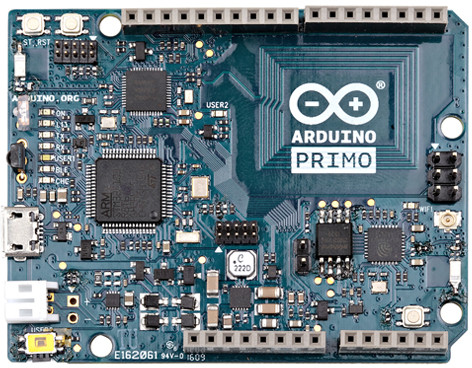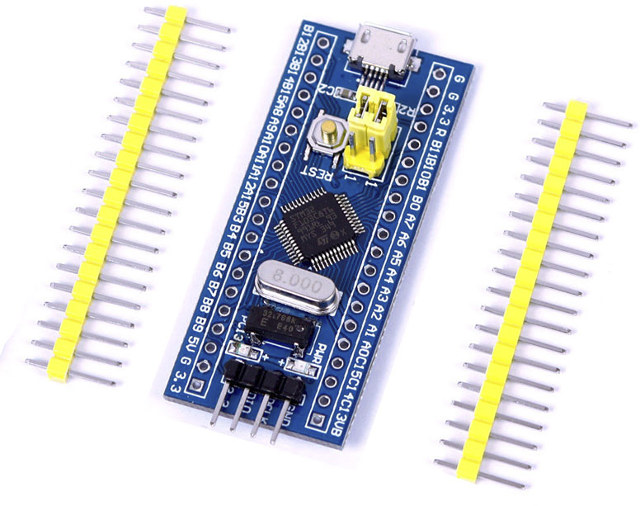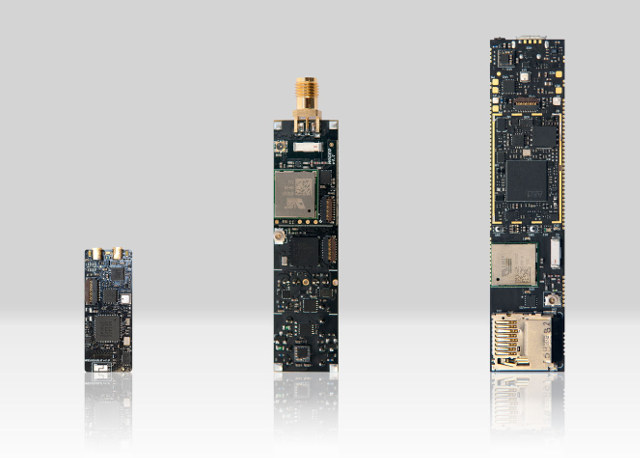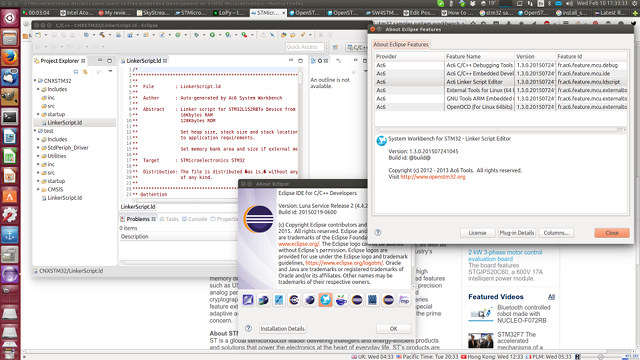STMicroelectronics introduiced its STM32F7 ARM Cortex M7 micro-controller family in 2014, and they released a $49 STM32F746G discovery board later in 2015. The company has now launched two new low cost development boards with the $23 STM32 Nucleo-144 board based on STM32F767 MCU, and a $79 Discovery Kit powered by STM32F746 MCU with TFT-LCD and MIPI-DSI support. STM32 Nucleo-144 development board Key feature of NUCLEO-F767ZI board: MCU – STMicro STM32F767ZI ARM Cortex M7 microcontroller @ 216 MHz with FPU, DSP, MMU, 2MB flash, 512 KB SRAM, 16 KB instruction TCM RAM (for critical real-time routines), and 4 KB backup SRAM Connectivity – IEEE-802.3-2002 compliant Ethernet connector USB – 1x micro USB OTG or full speed device Extension: ST Zio connector including support for Arduino UNO v3 connectivity, and additional signals (A6 to A8, D16 to D72) ST morpho extension pin header footprints for full access to all STM32 I/Os On-board […]
$49 STEVAL-WESU1 Wearable Sensor Unit Reference Design is Based on STMicro STM32 MCU
STMicroelectronics STEVEL-WESU1 is a wearable open source hardware reference design and development kit comprised of a board with STM32L1 ARM Cortex-M3 micro-controller, BlueNRG-MS Bluetooth LE chip, and sensors, a battery, and a watch band. STMicro “WESU” specifications and features: MCU – STMicro STM32L151VEY6 32-bit ARM Cortex-M3 MCU @ 32 KHz to 32 MHz, 512KB flash, 80 KB SRAM Connectivity – Bluetooth 4.0 LE via BlueNRG-MS BLE network processor Sensors – 3D accelerometer + 3D gyroscope (LSM6DS3), 3-axis magnetometer (LIS3MDL), MEMS pressure sensor (LPS25HB) USB – 1x micro USB port for recharging Debugging – SWD connector for debugging and programming capability Power 100 mAh Li-Ion battery included, UN38.3 tested and certified STNS01 Li-Ion linear battery charger STC3115 Fuel gauge IC Watch strap with plastic housing included Certifications – FCC (FCC ID: S9N-WESU1), IC (IC: 8976C-WESU1), RoHS The kit can be controlled by ST WeSU app for Android and iOS, and developed using BlueST […]
STAR OTTO Arduino Board is Based on STMicro STM32 32-bit Cortex-M4 MCU & ESP8266 WiFi SoC
Thanks to STMDuino32 community, there was already support for the Arduino IDE on board based on STMicro STM32 ARM Cortex-M micro-controllers, but STMicroelectronics and Arduino Srl have introduced the STAR program to bring official support, and unveiled their first board with STAR OTTO Arduino board powered by STM32F469 Cortex M4 MCU at Maker Faire Bay Area 2016. Key features of STAR OTTO board (ARD-OTTO-STM32): MCU – STMicro STM32F469BIT6 ARM Cortex-M4 MCU @ 180 MHz with 2 MB Flash memory, 384 KB SRAM, Chrom-ART graphics accelerator System Memory – 16 MB SDRAM Storage – 128 KB EEPROM, microSD slot Connectivity – Wi-Fi 802.11b/g/n @ 2.4 GHz via Espressif ESP8266 Display I/F – MIPI DSI display interface Camera – Camera connector Audio – 2x MEMS digital microphones, headphone and speaker output USB – 1x micro USB host interface Expansion – Arduino Uno, Due, Mega connectors including 8x ADC, 2x DAC, 32 digital […]
Arduino Primo Board Supports WiFi, Bluetooth LE, and NFC
A couple of weeks after unveiling Arduino UNO WiFi with ESP8266 and Atmel AVR, Arduino Srl has introduced Arduino PRIMO board with Nordic Semi nRF52 MCU with Bluetooth Smart and NFC, ESP8266 for WiFi, and STM32 to handle GPIOs and USB UART during May Faire Bay Area 2016. Arduino Primo board (A000135) specifications: Service Micro-controller STMicro STM32F103R8T6 ARM Cortex-M3 MCU @ 72 MHz with 64KB flash, 20KB SRAM USB/Uart converter & CMSIS-DAP GPIO expander, IrDA Board power management Operating Voltage – 2.0 to 3.6 V Arduino Micro-controller Nordic nRF52832 ARM Cortex-M4F MCU @ 64 MHz with 512 KB flash, 64KB SRAM Analog I/O Pins – 6 + 1 DAC DC Current per I/O Pins – 7 mA Bluetooth Smart – Up to +4 dBm output power, -96 dBm sensitivity Other features – PDM interface, AES HW enc, NFC tag WiFi Micro-controller Espressif ESP8266 Tensilica Xtensa LX106 WiSoC @ 80 MHz […]
“BluePill” is a $2 Arduino Compatible Development Board Based on STMicro STM32 MCU
I’m amazed that if your budget for a board was just $5 for one MCU board, you now have so many options for your electronics projects: ESP8266 boards, a few STM8 boards, One Dollar Board project, and many more… Other options are “BluePill” or “RedPill” boards based on STM32 or GD32 32-bit ARM Cortex M3 micro-controllers that go for about $2 shipped, and can be programmed with the Arduino IDE thanks to STM32Duino project. BluePill board specifications: MCU – STMicro STM32F103C8T6 ARM Cortex-M3 MCU @ 72 MHz with 64KB flash memory, 20KB SRAM. USB – 1x micro USB port for power and programming Debugging – 4x pin SWD header or micro USB port Expansion – 2x 20-pin with power signals, I2C, SPI, GPIOs, ADC inputs, etc… Misc – Reset button, two jumpers (for boot mode), power and user LEDs. Power – 5V via USB, 2.0-3.6V power via 3.3V pin on […]
Linux 4.6 Release – Main Changes, ARM and MIPS Architectures
Linus Torvalds released Linux Kernel 4.6 earlier today: It’s just as well I didn’t cut the rc cycle short, since the last week ended up getting a few more fixes than expected, but nothing in there feels all that odd or out of line. So 4.6 is out there at the normal schedule, and that obviously also means that I’ll start doing merge window pull requests for 4.7 starting tomorrow. Since rc7, there’s been small noise all over, with driver fixes being the bulk of it, but there is minor noise all over (perf tooling, networking, filesystems, documentation, some small arch fixes..) The appended shortlog will give you a feel for what’s been going on during the last week. The 4.6 kernel on the whole was a fairly big release – more commits than we’ve had in a while. But it all felt fairly calm despite that. Linux 4.5 added […]
LX IoT Cores Are Made for IoT and Wearables with Bluetooth LE, ANT+, 2G/3G, Sigfox, LoRa, and More
LX Group, an Australian company specializing in electronics design and embedded systems, has introduced three wireless modules for IoT and wearables which they call “LX IoT Cores”, and embeds various wireless protocol such as Bluetooth LE/Ant+, 2G/3G connectivity, WiFi, Lora, Sigfox, Taggle, etc… Let’s go though the main technical specs for the three modules, one of which it itself modular (hence the max and min size) depending on your requirements. LX Cellular Core (Right) MCU – STMicro STM32F217IGH6 ARM Cortex-M3 MCU @ 120 MHz with 1MB flash, 128kB RAM Storage – 1x micro SD card reader Communication Interfaces Radios – 2G/3G, WiFi, BLE, ANT+, provision for LoRa, Taggle, SigFox, optional GPS via daughter board Wired – USB, RS485, UART, SPI, I2C, Digital IO, ADC Sensors – Ambient Luminosity, accelerometer, gyroscope, magnetometer, temperature, humidity, air pressure, microphone USB – 1x micro USB port Misc – Reset and 2x user buttons, 2x […]
STMicro Releases Linux based STM32 MCU Development Tools
Until a few years ago, most development tools for micro-controllers were only available for Windows, but as Linux gained popularity among developers and engineers, community of developers designed development tools running in Linux, but only a few companies are providing tools that run on Linux operating systems. The good news is that STMicro has just announced the release of STM32CubeMX configurator and System Workbench for STM32, for both Linux and Windows, with Mac OS supporting coming on Q2 2016. Developped by Ac6 embedded systems company, System Workbench for STM32 relies on Eclipse IDE, supports the ST-LINK/V2 debugging tool under Linux through an adapted version of the OpenOCD project, and can be used with various STMicro STM32 boards including Nucleo boards, Discovery kits, and other Evaluation boards. You can give it a try by visiting OpenSTM32 Community, but for some reasons they ask you to register before accessing the installation instructions. […]


